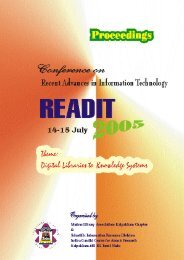READIT - 2009 - Indira Gandhi Centre for Atomic Research
READIT - 2009 - Indira Gandhi Centre for Atomic Research
READIT - 2009 - Indira Gandhi Centre for Atomic Research
You also want an ePaper? Increase the reach of your titles
YUMPU automatically turns print PDFs into web optimized ePapers that Google loves.
Knowledge Management <strong>for</strong> Improving Teaching –<br />
Learning Process in Higher Learning Institutions<br />
D.Gnanasekaran * , S. Balamurugan ** and R. Karpagam **<br />
* Bharathiar University, Coimbatore<br />
** Anna University Chennai, Chennai – 600 025.<br />
Email: dsekarg@gmail.com ; muruganbalas@indiatimes.com ; karpagam.au@gmail.com<br />
ABSTRACT<br />
This article discusses the origin and dimensions of knowledge, definitions of knowledge management,<br />
the need and process of implementing the knowledge management in the higher learning institutions,<br />
and various ICT tools involved in knowledge management. The role of the library professionals in<br />
implementing the knowledge management and various skills and capabilities they must posses are also<br />
discussed.<br />
Keywords: Knowledge Management, Knowledge Sharing, E-Learning, Knowledge Implementation,<br />
Knowledge Management Tools, Knowledge Management Process.<br />
1. INTRODUCTION<br />
The most of the activities in the academic institutions are based on in<strong>for</strong>mation<br />
and knowledge. The organisations depend on the library <strong>for</strong> their in<strong>for</strong>mation and<br />
knowledge needs. The knowledge requirement of the members of the organisation is<br />
ever changing. In the IT era more and more in<strong>for</strong>mation and knowledge are produced<br />
at each and every moment. Since all these in<strong>for</strong>mation are not valuable the libraries<br />
need to filter them and provide valuable, relevant and right in<strong>for</strong>mation at the right<br />
time to its members that is the main goal of the libraries. Management of in<strong>for</strong>mation<br />
and knowledge is essential to an organisation to achieve its goal. The application and<br />
practice of knowledge management in libraries elevate the present system which can<br />
be achieved <strong>for</strong> the betterment of both members and institution.<br />
2. ORIGINS OF KNOWLEDGE<br />
The knowledge depends on two factors namely Data and In<strong>for</strong>mation<br />
Data – This is a set of unfiltered, unprocessed and unorganized facts about an<br />
event which is discrete content and does not make much sense by itself. It has<br />
little use in itself unless converted into in<strong>for</strong>mation.<br />
<br />
In<strong>for</strong>mation – There are firms and organizations whose very survival rests<br />
solely on their effectiveness and efficiency in handling and keeping the raw<br />
data. Well processed and organized data gives in<strong>for</strong>mation. Davenport &<br />
Prusak 8 proposed a five ‘C’ processes <strong>for</strong> converting data into in<strong>for</strong>mation and<br />
the same is shown in figure .

















